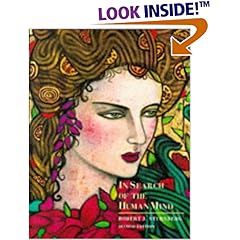The field of psychology is named in honor of the mythological Psyche (which means spirit or soul in both Greek and Latin).
Psyche was the youngest of three daughters of a great king. So beautiful was she in both countenance and spirit that people traveled from all over the world to admire her. Venus, goddess of beauty, become jealous of Psyche because their admiration of Psyche led people to neglect and even forget about Venus. So Venus devised a plot: She asked her son, Cupid, the god of love, to make Psyche fall in love with the most detestable creature in the world.
Cupid arranged for Psyche to be abandoned by her parents on a hilltop, where she would be betrothed to an ugly and vile winged serpent. Psyche wept at her fate but was resigned to her doom because, although she was beautiful, no one had in fact fallen in love with her, and so it seemed that only the winged serpent would have her.
Venus had not counted on one detail, though. Cupid, upon seeing Psyche, himself fell in love with her. Instead of bringing her a monster, he spirited her to his magnificent palace and made her his wife. However, because Psyche was a mortal, Cupid could not allow her to know either who he was or what he looked like. He visited her only at night and made her agree never to look upon him. Psyche lived a happy life with Cupid, although one of mystery.
Eventually, Psyche’s sisters, upon seeing the splendid palace where Psyche lived, became envious and devised a plot to ruin her. They poisoned her mind, assuring Psyche that if her husband was so secretive about his identity and dreadfully wrong with him. Clearly, they said, Psyche had ended up with the dreadful winged serpent after all.
Psyche finally could no longer bear the uncertainty of not knowing who her husband was or what he looked like. One night, while Cupid slept, she cautiously carried a lamp to his bed to gaze upon his face. Instead of seeing a monster, however, she saw a handsome a face as one could possibly imagine, and her hands started to tremble at the sight of her beloved husband. As she trembled, though, oil fell from her lamp and severely burned Cupid’s shoulder. He awoke, and finding that his wife had betrayed him, he fled.
In anguish at her faithlessness and at having hurt him and then lost him, Psyche vowed to show Cupid how much she love him by spending the rest of her life searching for him. She prayed to all of the gods for help, but none of them wanted to risk the wrath of Venus. Finally, in desperation, Psyche prayed to Venus herself.
Cupid had flown to his mother and asked her to treat his wound. When Venus heard that Cupid had married Psyche and that Psyche had betrayed her pledge to Cupid, Venus decided to punish Psyche severely. When Psyche begged for forgiveness from Venus, Venus belittled Psyche as faithless and plain and told her that her only hope for forgiveness was to perform certain tasks. The tasks were clearly impossible, but Psyche hoped that in her travels to complete the tasks she might find her lost love.
First, Venus took some tiny seeds of wheat, poppy, and millet, mixed them, and dropped them in a single pile. She gave Psyche until nightfall to separate the seeds. Psyche despaired, but a colony of ants, showing compassion, sorted them for her. Venus returned, and seeing what had happened, became even angrier.
So Venus gave Psyche more impossible tasks, such as to fetch the golden wool of some fierce sheep and to obtain black water from the river Styx. Again, through the help of others, Psyche fulfilled her tasks. Finally Cupid, who was now healed, longed for her once again. He went to her, scolded her gently for her earlier faithlessness, and assured her that her search was over. He longed to reunite with her, so he approached Jupiter, king of the gods, and beseeched him to grant Psyche immortality. Jupiter consented and, before an assembly of gods, made Psyche a goddess and announced that Cupid and Psyche were formally married. Even Venus was joyous: Her son now had a suitable match.
Moreover, with Psyche in the heavens rather than on Earth, people would no longer be distracted by Psyche’s beauty and would worship Venus once again.
The curiosity of Psyche and her search- for both knowledge ( of who Cupid was and what he looked like) and for love- are symbolic of our own spirit of inquiry as we go in search of human mind. The story of Psyche exemplifies many of the phenomena that psychologists seek to study: curiosity, envy, love, compassion, altruism, and perseverance.
Most of all, the story of Psyche is a symbol of the one thing that we all have that can be studied but perhaps never fully understood, of the one thing that is given to us but can never be taken away- the human spirit.
Despite tremendous obstacles, Psyche persisted in search for what made her soul complete.
Love and Soul …had sought and after some trials, found each other, and that union could never be broken.
(Hamilton, 1942, p.100)
(In search of the human mind / Robert J. Sternberg)

1 nhận xét:
Thx chị giáo. I really admired the creator of this masterpiece story.
Đăng nhận xét